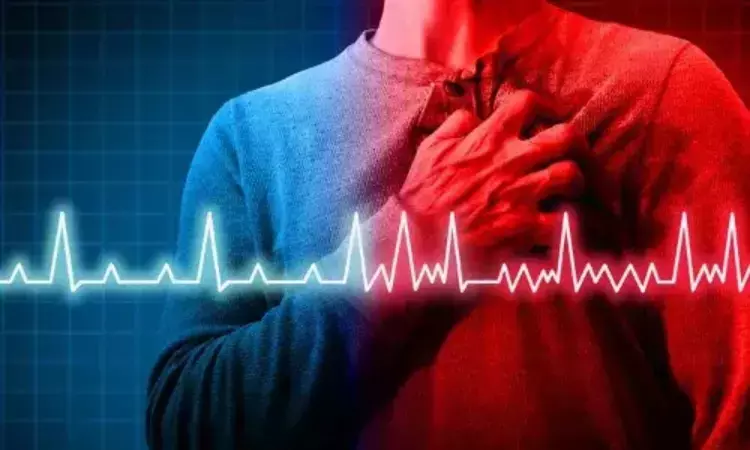- Home
- Medical news & Guidelines
- Anesthesiology
- Cardiology and CTVS
- Critical Care
- Dentistry
- Dermatology
- Diabetes and Endocrinology
- ENT
- Gastroenterology
- Medicine
- Nephrology
- Neurology
- Obstretics-Gynaecology
- Oncology
- Ophthalmology
- Orthopaedics
- Pediatrics-Neonatology
- Psychiatry
- Pulmonology
- Radiology
- Surgery
- Urology
- Laboratory Medicine
- Diet
- Nursing
- Paramedical
- Physiotherapy
- Health news
- Fact Check
- Bone Health Fact Check
- Brain Health Fact Check
- Cancer Related Fact Check
- Child Care Fact Check
- Dental and oral health fact check
- Diabetes and metabolic health fact check
- Diet and Nutrition Fact Check
- Eye and ENT Care Fact Check
- Fitness fact check
- Gut health fact check
- Heart health fact check
- Kidney health fact check
- Medical education fact check
- Men's health fact check
- Respiratory fact check
- Skin and hair care fact check
- Vaccine and Immunization fact check
- Women's health fact check
- AYUSH
- State News
- Andaman and Nicobar Islands
- Andhra Pradesh
- Arunachal Pradesh
- Assam
- Bihar
- Chandigarh
- Chattisgarh
- Dadra and Nagar Haveli
- Daman and Diu
- Delhi
- Goa
- Gujarat
- Haryana
- Himachal Pradesh
- Jammu & Kashmir
- Jharkhand
- Karnataka
- Kerala
- Ladakh
- Lakshadweep
- Madhya Pradesh
- Maharashtra
- Manipur
- Meghalaya
- Mizoram
- Nagaland
- Odisha
- Puducherry
- Punjab
- Rajasthan
- Sikkim
- Tamil Nadu
- Telangana
- Tripura
- Uttar Pradesh
- Uttrakhand
- West Bengal
- Medical Education
- Industry
Edoxaban fails to check mortality, stroke and systemic embolism among atrial arrhythmias detected by implanted cardiac devices

A recent randomized trial explored whether initiating anticoagulation therapy with edoxaban in patients with device-detected atrial high-rate episodes (AHREs) could reduce the risk of cardiovascular death, stroke, or systemic embolism.
The study found that Edoxaban did not significantly reduce the primary composite endpoint of cardiovascular death, stroke, or systemic embolism when compared to a placebo.
This study was conducted by Paulus Kirchhof and colleagues and was published in The New England Journal Of Medicine.
The trial included 2,536 patients aged 65 or older who had AHREs lasting at least 6 minutes and had one or more additional risk factors for stroke. Patients were randomly assigned in a 1:1 ratio to receive either edoxaban or placebo. The primary endpoint was a composite of cardiovascular death, stroke, or systemic embolism, assessed using a time-to-event analysis. The safety endpoint comprised a composite of death from any cause or major bleeding.
- The study population had a mean age of 78 years, with 37.4% being women. The median duration of AHREs was 2.8 hours.
- The trial was terminated early after a median follow-up of 21 months due to safety concerns and an assessment of futility regarding the efficacy of edoxaban. Enrollment had been completed at termination.
- The primary efficacy outcome occurred in 83 patients (3.2% per patient-year) in the edoxaban group and 101 patients (4.0% per patient-year) in the placebo group. The hazard ratio was 0.81 (95% CI, 0.60 to 1.08; P=0.15).
- The incidence of stroke was approximately 1% per patient-year in both groups.
- The safety outcome event occurred in 149 patients (5.9% per patient-year) in the edoxaban group and 114 patients (4.5% per patient-year) in the placebo group. The hazard ratio was 1.31 (95% CI, 1.02 to 1.67; P=0.03).
- ECG-diagnosed atrial fibrillation developed in 462 of 2,536 patients (18.2% total, 8.7% per patient-year).
Among patients with AHREs detected by implantable devices, anticoagulation with edoxaban did not significantly reduce the incidence of a composite of cardiovascular death, stroke, or systemic embolism compared with placebo. However, it led to a higher incidence of a composite of death or major bleeding. The incidence of stroke was low in both groups.
This trial underscores the complexities of managing patients with AHREs and highlights the need for careful consideration of the risks and benefits of anticoagulation therapy in this population. It also emphasises the importance of individualised treatment decisions and ongoing monitoring for the development of AF in such patients.
Reference:
Kirchhof, P., Toennis, T., Goette, A., Camm, A. J., Diener, H. C., Becher, N., Bertaglia, E., Blomstrom Lundqvist, C., Borlich, M., Brandes, A., Cabanelas, N., Calvert, M., Chlouverakis, G., Dan, G.-A., de Groot, J. R., Dichtl, W., Kravchuk, B., Lubiński, A., Marijon, E., … Zapf, A. Anticoagulation with edoxaban in patients with atrial high-rate episodes. The New England Journal of Medicine,2023;389(13):1167–1179. https://doi.org/10.1056/nejmoa2303062
Dr Riya Dave has completed dentistry from Gujarat University in 2022. She is a dentist and accomplished medical and scientific writer known for her commitment to bridging the gap between clinical expertise and accessible healthcare information. She has been actively involved in writing blogs related to health and wellness.
Dr Kamal Kant Kohli-MBBS, DTCD- a chest specialist with more than 30 years of practice and a flair for writing clinical articles, Dr Kamal Kant Kohli joined Medical Dialogues as a Chief Editor of Medical News. Besides writing articles, as an editor, he proofreads and verifies all the medical content published on Medical Dialogues including those coming from journals, studies,medical conferences,guidelines etc. Email: drkohli@medicaldialogues.in. Contact no. 011-43720751


